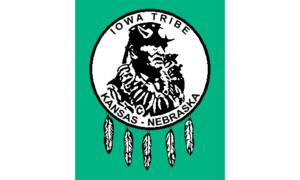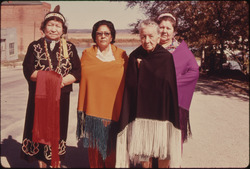Iowa Tribe of Kansas and Nebraska facts for kids

Tribal Flag
|
|

Four Iowa women in White Cloud, Kansas, 1974
|
|
| Total population | |
|---|---|
| 2,000 (1990s) | |
| Regions with significant populations | |
( |
|
| Languages | |
| English, Iowa | |
| Religion | |
| traditional tribal religion, Christianity, Native American Church | |
| Related ethnic groups | |
| other Iowa people, Otoe, Missoria |
The Iowa Tribe of Kansas and Nebraska is one of two federally recognized groups of Iowa people. This means the United States government officially recognizes them as a Native American tribe. The other recognized group is the Iowa Tribe of Oklahoma.
The tribe holds a special Indian movie night and a fun powwow every September. A powwow is a gathering where Native American people celebrate their culture. They often include dancing, singing, and drumming.
Contents
Where the Iowa Tribe Lives
The Iowa Reservation is located in the states of Nebraska and Kansas. You can find it in Richardson County in southeastern Nebraska. It also stretches into Brown and Doniphan Counties in northeastern Kansas.
The reservation covers about 1,500 acres (about 6 square kilometers). These lands are "checkerboard," meaning tribal lands are mixed with lands owned by non-Native people.
How the Tribe is Governed
The main office for the Iowa Tribe of Kansas and Nebraska is in White Cloud, Kansas. The tribe is led by a council of five members. These leaders help make important decisions for the tribe.
The current leaders are:
- Chairperson: Tim Rhodd
- Vice-Chairperson: Lance Foster
- Treasurer: Elyse Towey
- Secretary: Tony Fee
- Council Member: Robbie Craig
Tribe's Businesses
The Iowa Tribe of Kansas and Nebraska runs several businesses to help their community. They own and operate a dairy farm and a fuel station. They also have a business that processes grain.
For entertainment and dining, the tribe owns the Casino White Cloud and the Mahuska Restaurant. Both are located in White Cloud, Kansas.
A Look at Iowa Tribe History
The Iowa people speak a language called Chiwere Siouan. Long ago, they lived near the Great Lakes and were connected to the Ho-Chunk Nation. By the 1600s, the Iowa people were living in what is now northern Iowa and southern Minnesota.
In the 1820s and 1830s, the tribe signed many agreements with the U.S. government. In 1836, they were given a reservation near the Great Nemaha River. This area is close to the border between Kansas and Nebraska.
In the 1870s, the Iowa tribe split into two main groups. The Southern Ioway moved to an area called Indian Territory (which is now Oklahoma). The Northern Ioway stayed in Kansas and Nebraska. On February 26, 1937, they officially approved their own constitution and rules for their government.
Protecting Tribal Rights
During the 1940s to the 1960s, the U.S. government had a policy called "Indian termination." This policy aimed to end the special relationship between tribes and the federal government. It also sought to end reservations and stop federal help for tribes.
In 1940, the Kansas Act of 1940 was passed. This law gave the State of Kansas power over crimes that happened on or against Native Americans. Before this, only the federal government handled such cases.
In 1953, the U.S. Congress passed a resolution that called for ending federal recognition for several tribes. This included some tribes in Kansas, like the Iowa Tribe. If this had happened, the tribes would have lost all federal support and their reservations.
However, tribal leaders and members fought back. Minnie Wishkeno Evans, a leader from the Prairie Band of Potawatomi Nation, led the effort to stop termination. Many tribal members sent letters and went to Washington, D.C., to speak to Congress. Leaders from the Kickapoo Tribe in Kansas and the Sac and Fox tribes also spoke out. Their strong efforts helped the Iowa Tribe and other Kansas tribes avoid termination. This meant they kept their federal recognition and their reservations.
The Iowa Tribe Today
In March 2016, the Iowa Tribe of Kansas and Nebraska took action to protect their ancestral lands. They asked the Iowa Utilities Board to discuss a permit for a pipeline called the Bakken pipeline. This pipeline was planned to run through lands important to the tribe's history. The Utilities Board did not approve their request at that time.
 | May Edward Chinn |
 | Rebecca Cole |
 | Alexa Canady |
 | Dorothy Lavinia Brown |

